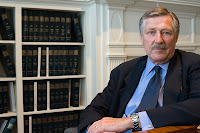DOJ spokesmen are laboring to minimize the damage from this report. They will stress that this was a single incident. But in fact, hardly a week passes without reports of scandalous misconduct by prosecutors involving the suppression of exculpatory evidence. And for every case that surfaces, probably ten do not, because a cloud of prosecutorial privilege envelops their conduct, shielding it from view. The Stevens case isn't even the worst example of prosecutorial misconduct in corruption cases involving public officials, though it is typical in terms of the complaints that it raised.
The case involving former Alabama governor Don Siegelman, for instance, features both more serious and better documented instances of wrongdoing by prosecutors. The conviction is still pending in that case, with the Justice Department steadfastly arguing, in the face of mounting evidence, that it did nothing wrong.
A member of the prosecution team has openly admitted that prosecutors cajoled, coached, and pressured two key prosecution witnesses to give false or misleading evidence--in one case conducting more than seventy intimidating interviews. She also acknowledged the existence of a binder filled with notes recording some of these sessions, which would have furnished powerful exculpatory evidence, and which might well have led a judge to bar the testimony entirely, but was withheld from the defense. Prosecutors initially misled the court about the existence of the binder, then conceded that they had it but wouldn't turn it over. The prosecutor who arranged and oversaw the entire matter was in fact the wife of the man managing the campaign of Siegelman's opponent--a hair-raising violation of prosecutorial ethics, which could have justified her removal from office and even her prosecution. When her role was exposed, she made a pretense of recusing herself from the case, though one of her own staffers acknowledged that she continued to run it. Senior figures in the Justice Department, notably David Margolis, dismissed concerns about this reprehensible conduct--apparently feeling that any acknowledgement of wrongdoing would tarnish the department as a whole. They then stonewalled the House Judiciary Committee's efforts to investigate the matter and blocked production of materials sought under the Freedom of Information Act.
The major difference between the Siegelman and Stevens cases is simple: the Stevens case was presided over by Emmet Sullivan, one of the nation's most respected federal judges. When he sensed that something was wrong with the prosecution's handling of the case, he pressed them on it, and when it was clear that prosecutors had lied to or misled him, he appointed a special prosecutor to investigate their misconduct. In the Siegelman case, by contrast, the judge attempted to press the same sort of questions that Emmet Sullivan did, but prosecutors responded by maneuvering, through bizarre sleight of hand, to bring their case to a different district before a judge who they fully knew had a grudge against Siegelman--a highly unethical maneuver that paid off handsomely.
These facts help explain why, as the Wall Street Journal reports, more than 100 former state attorneys general from both political parties have joined in a brief asking the Supreme Court to overturn the Siegelman conviction--a historically unprecedented campaign. George Will recently backed the initiative.
A Congressional inquiry into the systematic misconduct inside the Criminal Division is necessary, as is legislation, such as the bill recently proposed by Senator Lisa Murkowski (R., Alaska), that would sanction prosecutors who withhold exculpatory evidence. The Department must be challenged on its persistent whitewashing of ethics violations, and on its obstinate refusal to punish prosecutors who engage in acts that might well be prosecuted if they were done by defense counsel. The Justice Department says constantly that it "takes its disclosure duties seriously," but its conduct plainly establishes the opposite. The Department's credibility and integrity are now plainly on the line.





